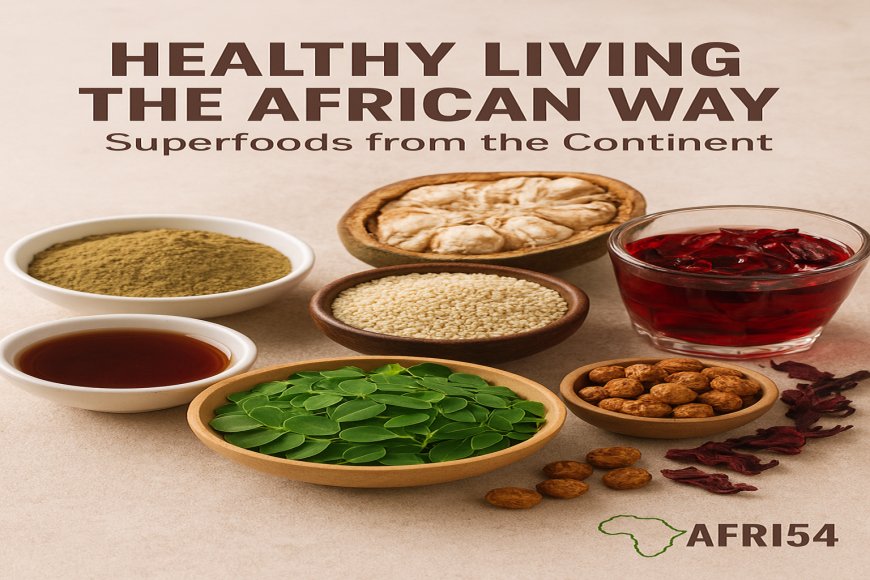Healthy Living the African Way: Superfoods from the Continent
Healthy living does not always mean chasing imported supplements or the latest diet craze. Sometimes, it means looking inward—towards the traditions that have nourished generations. African superfoods like moringa, baobab, fonio, tigernuts, and hibiscus are not just trendy; they are timeless. By embracing them, we not only improve our well-being but also celebrate Africa’s rich heritage of holistic living.

In a world where wellness trends and health supplements are constantly on the rise, Africa remains one of the richest yet most underrated sources of natural superfoods. Long before the word “superfood” became a buzzword in health circles, African communities had been thriving on nutrient-dense plants, fruits, and grains that not only nourished the body but also carried cultural significance. Today, these foods are gaining global recognition, proving that African traditions hold timeless secrets to healthy living.
1. Moringa – The Miracle Tree
Often called the “miracle tree,” moringa is native to parts of Africa and Asia but has deep roots in African diets and medicine. Every part of the plant—from leaves to seeds—is edible and nutrient-rich. Packed with iron, vitamin C, calcium, and protein, moringa leaves are often dried into powder or boiled fresh in soups. For centuries, African households have relied on it to boost energy, strengthen immunity, and even improve lactation in nursing mothers.
2. Baobab Fruit – The Tree of Life
The iconic baobab tree, with its thick trunk and sprawling branches, produces a fruit that’s nothing short of extraordinary. Baobab fruit pulp is high in vitamin C, antioxidants, and fiber. Traditionally, it is soaked in water to make a refreshing drink or eaten as a tangy snack. Beyond its nutritional value, the baobab has spiritual and communal importance, often symbolizing life and resilience across many African cultures.
3. Fonio – An Ancient Grain Making a Comeback
Fonio, one of Africa’s oldest cultivated grains, is gluten-free, highly digestible, and packed with iron, amino acids, and essential minerals. For centuries, it has been a staple in West Africa, often used in porridges or couscous-like dishes. As the world seeks healthier grain alternatives, fonio is now being rediscovered as a sustainable and climate-resilient crop that could revolutionize global diets.
4. Tigernuts – Nature’s Energy Snack
Known as ofio in Nigeria or atadwe in Ghana, tigernuts are not actually nuts but small tubers rich in fiber, magnesium, and healthy fats. Traditionally, they are chewed raw, roasted, or blended into a creamy drink called kunu aya. Tigernuts support digestive health, provide long-lasting energy, and are even believed to boost fertility—a true lifestyle food that connects nourishment with vitality.
5. Hibiscus – The Healing Flower
The hibiscus plant, widely enjoyed across Africa as zobo in Nigeria or bissap in Senegal, is more than just a refreshing red drink. Its petals are rich in antioxidants and are known for lowering blood pressure, aiding digestion, and cleansing the body. Beyond health, hibiscus drinks are central to celebrations, hospitality, and everyday social life, making it both a wellness booster and a cultural delight.
Traditional Meets Modern
What makes these superfoods unique is not just their nutritional power but also the way they blend tradition with modern living. While moringa powders are now being sold in Western health shops, many African families still add fresh leaves to their stews. Hibiscus has found its way into trendy cocktails and skincare products, while fonio is featured on international menus as a gourmet grain. This fusion highlights Africa’s contribution to global wellness while reminding us that true health often lies in heritage.
Why Choose African Superfoods?
-
Natural Immunity Boosters: Packed with vitamins, minerals, and antioxidants.
-
Affordable & Accessible: Many are locally available and cost-effective.
-
Support Local Farmers: Buying and promoting African superfoods helps smallholder farmers and strengthens local economies.
-
Sustainable Living: These crops thrive naturally in African climates with minimal environmental impact.
Conclusion
Healthy living does not always mean chasing imported supplements or the latest diet craze. Sometimes, it means looking inward—towards the traditions that have nourished generations. African superfoods like moringa, baobab, fonio, tigernuts, and hibiscus are not just trendy; they are timeless. By embracing them, we not only improve our well-being but also celebrate Africa’s rich heritage of holistic living.
So, the next time you’re reaching for a wellness boost, think African—because healthy living has always been part of our way of life.
Have you listed your business on Afri54?
Afri54 exists to solve a fundamental challenge faced by millions of African businesses: lack of visibility. Whether you're an automobile part seller in Ladipo Lagos, a local attire manufacturer in Kigali, a coffee exporter in Addis Ababa, or a mobile phone supplier in Accra, you deserve to be discovered.
We provide the platform—you bring the value. Get started






















